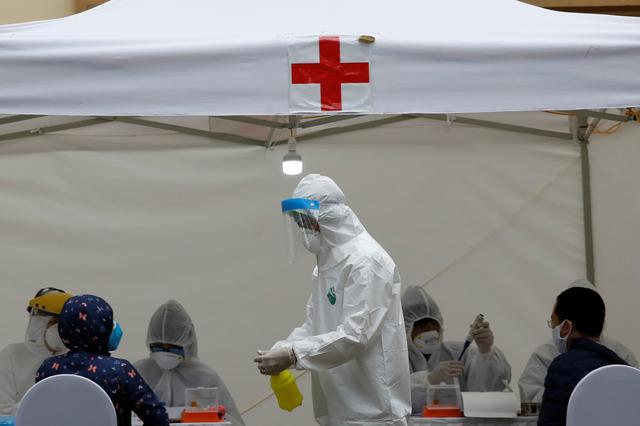It was late January, just after the Lunar New Year. Vietnam had detected its first two cases of the new coronavirus days earlier, and the government was contacting companies with experience of medical testing for urgent help.
“The official said Vietnam needed to act quickly,” said Viet, whose medical equipment company, Viet A Corp, makes test kits and has been central to Vietnam ramping up its testing programme in response to the outbreak.
Vietnam, a country of 96 million people which shares a border with China, is signalling that it has succeeded where many wealthier and more developed countries have not by containing the new coronavirus.
The government is officially reporting a relatively small 270 cases and zero deaths. That puts the country on course to revive its economy much sooner than most others, according to several public health experts interviewed by Reuters.
Its slightly more populous regional neighbour the Philippines, in comparison, has reported almost 30 times as many cases and more than 500 deaths.
These public health experts say Vietnam was successful because it made early, decisive moves to restrict travel into the country, put tens of thousands of people into quarantine and quickly scaled up the use of tests and a system to track down people who might have been exposed to the virus.
“The steps are easy to describe but difficult to implement, yet they’ve been very successful at implementing them over and over again,” said Matthew Moore, a Hanoi-based official from the U.S. Centers for Disease Control and Prevention (CDC), who has been liaising with Vietnam’s government on the outbreak since early January. He added that the CDC has “great confidence” in the Vietnamese government’s response to the crisis.
Vietnam increased the number of laboratories that can test for COVID-19, the disease caused by the new coronavirus, from three at the beginning of the outbreak in January, to 112 by April.
As of Wednesday, 213,743 tests had been conducted in Vietnam, of which 270 were positive, according to health ministry data.
That ratio of 791 tests to every confirmed case is by far the highest in the world, according to data from health ministries compiled by Reuters. The next highest, Taiwan, has conducted 140 tests for every case. To see results by country, click tmsnrt.rs/3bO6dsK
Reuters could not independently verify the accuracy of the government’s testing data. The Vietnamese government did not reply to questions about its data and the extent of its awareness of virus-related cases. The two officials leading the country’s efforts against the virus were not made available for interviews to answer questions about their work.
Kidong Park, the World Health Organization’s representative in Vietnam, said there was no indication of any outbreaks beyond what had been reported by the government.
Vietnam has been helped, experts said, by the combination of its authoritarian leadership and its open market economy, and a population with a memory of previous epidemics ready to cooperate.
“It is organised, it can make country-wide policy decisions that get enacted quickly and efficiently and without too much controversy,” said Guy Thwaites, director of the Oxford University Clinical Research Unit in Ho Chi Minh City. Thwaites’s laboratory has been helping to process tests.
Thwaites said the number of positive tests processed by his organisation’s lab was in line with government data. He said the hospital where he works on the wards – Ho Chi Minh City’s 550-bed Hospital for Tropical Diseases, serving a population of 45 million people in southern Vietnam – had not admitted any additional cases not reflected in the government’s numbers.
“If there was ongoing and unreported or unappreciated community transmission, we would have seen the patients in our hospital. We have not,” he said. Thwaites said his organisation’s lab increased capacity from being able to do around 100 tests a day to around 1,000 a day.
Managers of 13 funeral homes in Hanoi contacted by Reuters said they had seen no uptick in deaths. One said requests for funerals had gone down during the country’s lockdown, now lifted, because of the reduction in traffic accidents, one of the biggest killers in Vietnam.
Todd Pollack, a Hanoi-based infectious diseases specialist at Harvard Medical School, said that less than 10% of the people who tested positive for the virus in Vietnam were over 60 – the age group most likely to die from COVID-19. All patients, he added, were closely monitored in health facilities and given good medical care. Pollack said a good comparison to Vietnam was South Korea, another country which managed to roll out a large testing programme and keep deaths relatively low.
“The case fatality rate in South Korea is around 2%, in part because they are testing so widely,” said Pollack. “If we apply that rate to Vietnam’s number of confirmed cases, and consider these other factors, we can understand how they have avoided any deaths so far.”
Krutika Kuppalli, an infectious disease physician and biosecurity fellow at the Johns Hopkins Center for Health Security, said: “There is no way to possibly know for certain, but they have done a great job with their response, with the testing and isolating and quarantining people.”
Reuters
More about: Vietnam
















































